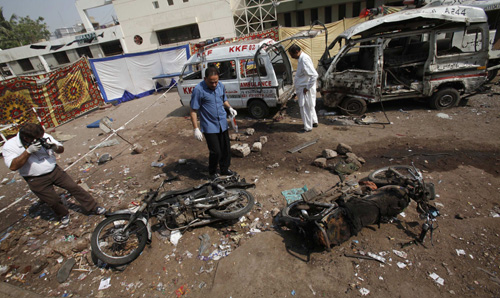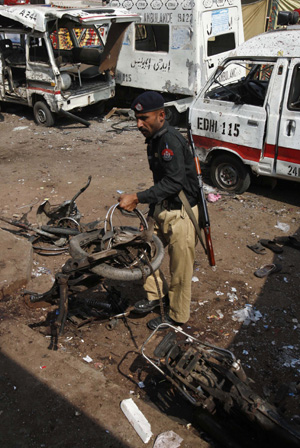Death toll from Karachi blasts reaches 33
Death toll from twin-bombing, targeting Shiite Muslims in the Pakistani port city of Karachi on Friday, has reached 33, provincial health minister said Saturday.
 |
|
A team of investigators examine the site of a bomb blast, which killed 33 people, outside Jinnah hospital in Karachi February 6, 2010.[Xinhua/Reuters Photo] |
Dr Sagheer Ahmed, Health Minister of southern Sindh province of which Karachi is the capital, said that several other injured died of wounds in hospitals.
He said that a total of 167 people were injured and 89 are still being treated in government and private hospitals.
No group has yet claimed responsibility for the attacks and the police have blamed a banned group "Jundullah" for the blasts.
The government has formed a team of police and intelligence agents to investigate the deadly attacks. There is still confusion about the nature of the twin-bombings.
 |
|
A policeman goes through parts of a damaged motorbike at the site of a bomb blast, which killed 33 people, outside Jinnah hospital in Karachi February 6, 2010.[Xinhua/Reuters Photo] |
Earlier police said both were suicide attacks but now investigators say that the bombs were planted and exploded through remote control.
Thousands attended funeral for 21 victims under tight security who were later buried amid touching scenes.
A bomb-attached to a motorcycle exploded near a bus, carrying Shiite Muslims, at M.A. Jinnah road which killed 13 people, including women and children.
Another bomb blast happened at the emergency gate of the city's main hospital where the injured of the first blast were being treated, police said. Police said 12 people were killed in the second attack, occurred two hours after the first blast.
Seven activists of main group "Mutahida Qaumi Movement" (MQM) and five members of same Christian family were also killed in the hospital blast.
Meanwhile, a wheel-jam strike called to condemn twin-bombing Saturday brought life in the Pakistani port city of Karachi to a standstill.
Shiite groups had announced strike on Saturday while traders and transporters supported the call. Strike was also observed in other major cities in Sindh province.
All major markets in Karachi, also the country's commercial capital with 18 million population, remained closed and transport off the roads. Karachi University and other educational institutions had postponed examinations. All patrol stations in the city were also closed.
 0
0 






